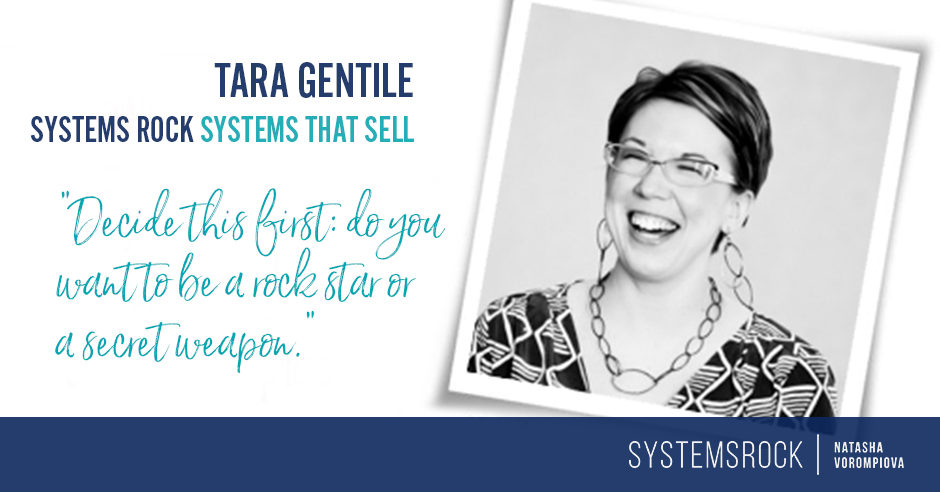The other day I was chatting with a friend of mine who is the owner of a rapidly growing business. We were chatting about ways to bring some sanity back into her life, because some aspects of her business were getting out of hand.
At one point, my friend, who had recently interviewed Tara Gentile, said: “It’s amazing! Tara has SO much going on, but when we talked, she sounded so relaxed, almost carefree, sharing with me all the projects she’s working on. HOW does she do it?”
Indeed, Tara has A LOT going on:
- Membership community – The Lab
- Speaking engagements
- Her own events
- Coaching & mastermind program – Quiet Power Strategy: Foundation (formerly10ThousandFeet)
- Apprenticeship program
- CreativeLive workshops
- And much-much more
How does she manage it all and do it with so much ease?
If you ask me, there are 3 things that totally set Tara apart from anyone I have ever worked with:
- When you speak with her, she listens. Truly listens. She hears nuggets that most people don’t notice.
- She connects those ideas in such a way that it opens completely new (and, more often than not, lucrative) horizons for you.
- Though she claims not to be super organized, she is incredibly methodical. She approaches creating programs like a fine artist, who perfects her master piece over time—brush stroke by brush stroke—until it’s flawless.
The result—mind-blowing success stories from her clients and a business that doesn’t take over her entire life.
So, today I wanted to put Tara on the spot and have her share some of her behind-the-scenes secrets. 🙂
Natasha: Tara, one of the things I noticed is that you are incredibly intentional about products and services you offer. How do you decide what should be on your offerings list?
Tara: Well, that’s funny, because I am intentional about it but I also move fast and break things. I’ve never been one to be afraid of experimenting with something that’s not quite ready for “prime time.” But that’s how you learn and how you become more intentional about development in the future.
As for deciding what’s in my offering list, over the last 3 years, I’ve really decided to make my model as simple as possible. For me, that means offering support for entrepreneurs who are at different parts of their journey. Instead of thinking about the problems my work solves as unique, I think about them as inevitable. Then, I match up the problem with what I solve it with when an entrepreneur is going to encounter it on their journey and make an offer than anticipates that.
Speaking, events, and workshops aren’t really part of my business model. They’re icing on the cake. It’s not something that gets worked into the plan and it’s not revenue I anticipate. That’s where I experiment!
Natasha: I have to tell you: back in the day you totally liberated me when you told me that to have a successful business I didn’t have to strive for a massive following. So let me ask you: how would you help someone determine what the right business model is for them?
Tara: At it’s most basic, you have to decide whether you like being the rockstar on stage or you like being the secret weapon. If you don’t like being the center of attention, I guarantee you you’re not going to do the things you need to do to make a business model work that relies on a massive following.
And vice versa, if you crave the limelight, you’re not going to want to do what it takes to have a thriving private practice.
Once you decide that, you can determine what kind of offers fit the model you’re wanting to build. Don’t try to fill a course with 50 or 100 people if you don’t want to build your list to many thousands. Don’t try to take on 15 coaching clients if what you really want is to speak to thousands.
Natasha: When somebody examines the list of offerings they currently have, what clues do they need to look for to discover new opportunities for their business?
Tara: First, look for holes. Where do people get tripped up moving from offer to offer? There’s potentially a new product or service opportunity there.
Second, look for things that you don’t have the marketing or sales infrastructure to make work. As I said, you’re not going to fill a big course without a nice sized list.
Third, eliminate redundancy. Are you selling the same value proposition 3 times over in different formats? Stop! Think about the best way to deliver your product and stick with it.
Finally, look for the thing that’s working best. What makes the most money with the least effort or heartache? How can you leverage that offer to sell more of other things? What new offers could you naturally follow-up with?
Natasha: How often do you examine your business model?
Tara: Well, I’ve been working toward the same model for about 2 years now. Before that, I was updating and tweaking my model about once every 6 months. You definitely need to reexamine it more in the early stages. As you start building offers for the long-term, your model should stay more consistent.
Then it’s about optimizing and keeping your eyes out for opportunities to disrupt the market. You don’t want to get Netflixed because you were ignoring trends.
Natasha: What helps you stay focused in between business model reviews? How do you decide what to invest your time in and what not?
Tara: New goals! Just because your business model is more or less consistent from review to review doesn’t mean you can’t optimize for new goals. This year, I’ve been working towards doubling my revenue while bringing more and more people on my team to help accomplish that goal.
But I don’t just look at my bottom line. Each product system within my business model has a separate goal attached to it. For instance, we’re going from enrolling 15 people in 10ThousandFeet to enrolling 40. That means bringing new people–like yourself!–on board and creating the marketing and sales systems that allow that to happen.
Natasha: How do you ensure that when you launch a new program you don’t have to put the rest of your business on hold to manage it?
Tara: You’ll like this answer, Natasha: systems. I have a system for launching that works really well for me. It includes content strategy, outreach, and email marketing. The other part of this answer is team-building. I can’t launch anything new at this point that doesn’t require getting help. So I either look within the organization to find people who can support the launch, or I bring on someone new.
Natasha: I know that most programs you launch grow from a beta, to a small group, to a larger group. You perfect over time not only the content but also the back-end systems to manage the program. I’m very curious about the last part. 🙂
What systems do you put in place so that as you grow the programs and/or introduce new offerings you are still able to (1) preserve the quality of service and (2) keep your sanity?
Tara: To me, sanity and growth are one in the same because I’m not fully sane if things aren’t moving forward! The systems I use are mostly content systems and feedback systems. I keep track of all my content in Evernote and now I have a project manager helping to manage that content system. I also track feedback in Evernote, but the rhythm is the most important part there. After each cohort of 10ThousandFeet completes, for instance, I ask for case studies. Those case studies greatly inform how I improve the program and they’re also great marketing.
Finally, we’re very open to receiving feedback at all times. The questions people ask, the situations they run into, the difficulties they have with the content, that’s all feedback that can help improve the experience. I listen, take notes, and don’t feel bad when I realize new things in the moment!
Natasha: What’s next for you?
Tara: The next thing for me is going to be a book of Quiet Power Strategy. I’m excited about shedding light on strength and power that doesn’t look like constant hustling, pseudo-celebrity, and uncomfortable self-promotional tactics.
Natasha: Thank you so very much, Tara!
BIO
Tara Gentile is an author, speaker, and entrepreneur. She’s the creator of Quiet Power Strategy® (formerly 10 Thousand Feet), a business planning system for idea-driven entrepreneurs. She’s also the host of Profit. Power. Pursuit., a podcast that takes you behind the scenes of successful small businesses. Take Tara’s free course on setting more profitable prices for the products and services you offer: click here.
BACK TO YOU
What nuggets of Tara’s wisdom most resonated with you? What lesson are you taking away?



Hi Natasha – thanks for providing this interview. These are Tara’s words that spoke to me the most:
“…eliminate redundancy. Are you selling the same value proposition 3 times over in different formats? Stop! Think about the best way to deliver your product and stick with it.
Finally, look for the thing that’s working best. What makes the most money with the least effort or heartache? How can you leverage that offer to sell more of other things? What new offers could you naturally follow-up with?”
I sell my art. I realize now I don’t need to sell it 10 different ways – just one good way. Maybe two. 1)At art shows and 2)on my website.
Now I have something good and concrete to focus on!
Oh, that’s fantastic, Rene!!
Awesome insight as always Natasha – your emails are the ones I always open!
Love this from Tara – THAT is very interesting and so needed! Can I buy an advance copy of the book? 😉
Tara: The next thing for me is going to be a book of Quiet Power Strategy. I’m excited about shedding light on strength and power that doesn’t look like constant hustling, pseudo-celebrity, and uncomfortable self-promotional tactics.